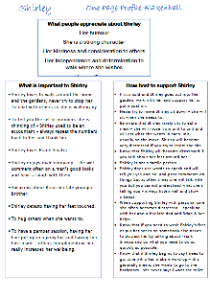A powerful example of how a one-page profile can empower people living with dementia to direct their own support. Shirley is now supported in a way that makes sense to her thanks to the deeper understanding people have about what is important to and for her.
Written by Narindra Devi and Gill Bailey
Shirley is 78 years old and a retired accountant living in Wolverhampton. For the last five years Shirley has lived in a residential service supporting people living with dementia. Described as a strong character who is always kind and considerate, Shirley is very active and can rarely be found sitting down but prefers to be on the go, walking around and chatting to others.
As someone who has worked with numbers her whole life it isn’t surprising that Shirley still talks about and quotes numbers to people regularly. This is something that the staff who know Shirley well understand and are able to respond to. In the same way, the support staff who know Shirley well realise how important it is to enable her to freely move around and how she doesn’t like to sit still. Recently it became apparent that some staff didn’t know these important details about Shirley. She was being asked to sit down more which was causing her to be distressed and she was also getting upset when her support team didn’t converse with her about numbers and statistics; something that she loved to do.
Meeting together, the staff team realised that only a few of them knew what worked for Shirley and that they needed to find a way of sharing this information more widely so that everyone could support Shirley well. To do this they used a one-page profile. Together the team talked about all the things that were important to Shirley and what best support looked like. They shared what they like and admire about Shirley and these appreciations were all captured on her one-page profile.
The profile communicates vital information about how to support Shirley well. All staff must be aware never to try and make Shirley sit down as this would lead to her becoming very distressed and could lead to her harming herself or others. They also learnt that when giving Shirley medication they should wait for her to pass and never chase after her as this would create great distress and anxiety for Shirley. Another rich insight that is shared on Shirley’s profile is her dislike of people touching or talking about her feet. Making staff aware of this means they can avoid upsetting Shirley unintentionally.
Shirley now has more control over how she lives because the people who support her understand what is important to her. She now goes for walks outdoors as much as possible. Previously staff would have shied away from supporting her outside if it was raining but they now understand how important this time is for her and acknowledge that going out for a short time in a little rain won’t cause Shirley any harm and actually she appears to love to feel the rain on her face if her huge smile is anything to go by!!
Even new staff can get to know Shirley well and quickly by looking at her one-page profile.
Shirley is much more relaxed and content since developing her one-page profile. It is my belief that if we are to truly personalise support for people living with dementia, we have to support a way of living which makes sense to the person as well as ensuring they stay healthy, safe and well. This has been achieved for Shirley.
For more details on Gill Bailey and Helen Sanderson’s book; Personalisation and Dementia please visit Jessica Kingsley Publishers.

